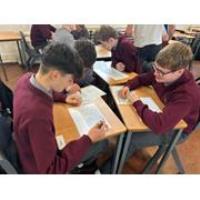
Waterford is embracing a new era of sustainable urban development with the launch of the ScoilAer project, designed to improve air quality and provide safer routes for students walking to school. This initiative is powered by Trilateral Research’s STRIAD:AIR technology via a partnership with Waterford’s Climate Action Team, thanks to €20,000 in EU funding.
1000 students from De La Salle College and Waterpark College are using advanced data solutions to map clean, healthy paths for school commutes, getting them acquainted with data-driven solutions and building readiness for the AI revolution.
EU Funding Brings Impactful Investment to Waterford
This investment via the European Union’s Horizon Europe programme and its IMPETUS initiative strengthens Waterford’s infrastructure for sustainable travel, fostering local growth while providing critical technology and training for students involved. The ScoilAer project is poised to create meaningful impact on public health, enhance the community’s air quality, and position Waterford as a model for cities dedicated to climate-conscious development.
Active Travel for Healthier Communities
Active travel—walking, cycling, and wheeling—plays a key role in improving health, reducing air pollution, and cutting carbon emissions. However, students walking near congested areas are exposed to higher pollution levels, which can make their journeys both unpleasant and harmful. STRIAD: AIR, Trilateral’s advanced air quality monitoring tool, utilises real-time and historical data to pinpoint cleaner routes for students, minimising their exposure to pollution on the way to school. This initiative will contribute to Waterford’s 2040 goals, which include the aim of becoming completely carbon neutral. Cian Gill, Climate Action Officer at Waterford City and County Council, emphasised the impact of the ScoilAer project, stating that,
“Waterford City & County Council were delighted to take part, through the Climate Team, in the ScoilAer project with Trilateral Research. This EU-funded project was significant in helping us to equip and train schools in Waterford with air pollution monitors, the skills to use them, and also provided real, hands-on citizen science data collection regarding air pollution in the city. In particular, Decarbonizing Zone Action 10.16 ‘Air Pollution Monitoring Programme’ which calls for expanding an air quality monitoring programme for schools in Waterford city and an accompanying education programme, got off to a really productive start thanks to this project. As a result, we now have the beginning of a network of students/citizens able to use the monitors to collect data as part of a long-term system for analysing patterns, trends and preferential routes within the city.”
The Human Factor: ScoilAer Project Engages Waterford’s Youth
Recognising that air quality is only one component of what makes a route appealing, Trilateral launched the ScoilAer project to incorporate the ‘human factor’ into its data models. As part of the initiative, Waterpark and De La Salle students participated in workshops to share their experiences walking to school, highlighting routes they felt were either safe or unsafe, and pointing out areas they would like improved. Issues such as heavy traffic, narrow pavements, and dim lighting in winter were raised, along with the students’ concerns about road safety.
These insights are now guiding the creation of walking maps that prioritise low-pollution routes and reflect students’ feedback on where they feel safest. This innovative approach brings together environmental data and real community insights for a more enjoyable, accessible school commute.
Citizen Science at the Forefront
A core element of ScoilAer is enabling students to take an active role as ‘citizen scientists,’ gathering data on air quality across the city. Equipped with mobile monitoring devices, students are trained to measure pollution levels along various routes. In early October, Trilateral’s Head of Irish Operations, Dr Rachel Finn, joined students to observe their engagement with the project, stating that
“The students were very excited about the opportunity to do meaningful data collection with industry-leading air quality monitors on the streets they travel on every day. Combining environmental readings with advanced analytics really opened their eyes to how AI can have positive impacts on climate action and community wellbeing.”
Student-Led Mapping and Outreach
In the project’s most recent phase, collected data was integrated into maps that highlight the safest, cleanest routes to schools across Waterford. By allowing students to lead outreach such as this, the project fosters environmental responsibility and engages them in the future of sustainable urban planning.
Supported by EU funding and driven by Trilateral’s STRIAD technology, the ScoilAer project is setting new standards for safe, active travel in Waterford. This innovative approach brings the benefits of cleaner air, enhanced public health, and a more connected community, while supporting the next generation’s role in creating sustainable, people-centred urban spaces.



